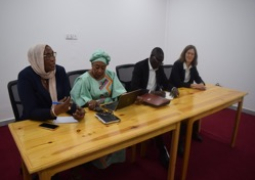
“So does its core activity to adjudicate on disputes, hear and determine cases fairly and expeditiously without unreasonable delay,” he said at the official opening of the Legal Year 2023.
“But the size of this workload is constantly on the rise. In the year 2022 a total number of 11,568 new cases were filed across all the courts from the Supreme Court to the Subordinate Courts – the magistrates, Cadi courts children Courts as well as the Specialized tribunals. This represents a significant increase of 30% on the 8882 cases for the year 2021.”
“In 2022 the courts were able to dispose of a total of 6,800 cases representing 58% of the workload and an increase of 1,978 on the total of 4822 cases disposed of in 2021.”
“I would like to congratulate all the judicial officers and their staff for this commendable achievement under challenging conditions. As well as the members of the Bar and indeed litigants and witnesses who have contributed to this achievement.”
“Your Excellency and distinguished guests we have observed that the majority of the case workload of the courts relates to civil matters, a significant portion of them being land disputes from the West Coast Region. Some of the land disputes involve communities, some emanate from the alleged activities of estate agents.”
“Land is undoubtedly a very precious and scarce resource everywhere, especially in The Gambia. Unresolved disputes over it can have an impact on communal peace and stability. Speedy resolution of land disputes is thus very essential. As is the speedy and fair resolution of commercial disputes for the economy. Hence the need for the State to establish a well resourced Land and/commercial Disputes Court as envisaged by the Judiciary Strategic Plan.”
“This should be accompanied by the review and reform of the legal sector relating to land to provide for a more efficient and effective system of land administration. Of particular concern are the activities of some estate agents with many litigants being alleged victims of such agents. The estate agency sector remains unregulated. There is an urgent need for enactment of laws which regulate the activities of estate agents including their registration, qualification, supervision and discipline.”
Salieu Taal, the president of the Gambia Bar Association (GBA), explained that from 2017 to date, the judiciary has delivered landmark judgments which among other things have reiterated the supremacy of the constitution, the limits of legislative authority, the limits of executive power, the enforcement of fundamental rights and limits of constitutional immunity among others.
He continued that rulings and dicta from our courts in many respects are defining the contours of our nascent democracy and importantly helping enhance respect for the rule of law in the country.
"The road to justice is still a pipe dream for the average litigant in The Gambia and a long one for that matter. High-profile cases tend to get expedited hearings and are concluded in a relatively shorter period of time. However, the majority of cases both civil and criminal can take an inordinate amount of time to be concluded in our jurisdiction," he stated.
He added that the delays in the conclusion of cases are more problematic in criminal cases, especially in relation to accused persons charged with non-bailable offences or indigent defendants unable to fulfil bail conditions.
"The continued investment in human and physical infrastructure will greatly improve the delivery of justice,” he suggested, while welcoming the Judiciary's expansion of the courts and recruitment drive.
“We also call for the allocation of more resources to support the judiciary from the State and development partners," Taal buttressed.





